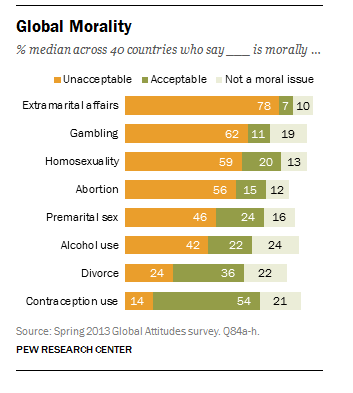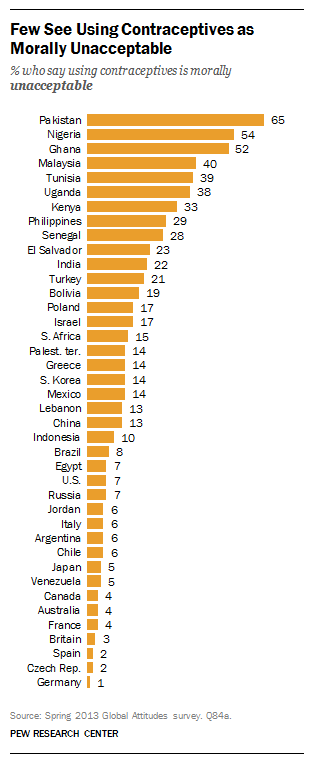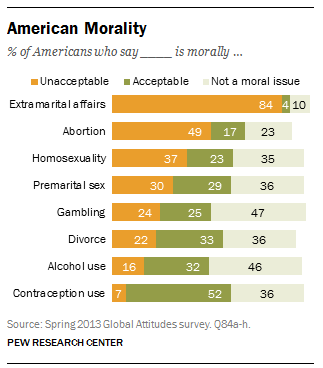The Pew Research Center asked people in 40 countries about what is morally unacceptable, morally acceptable or not a moral issue. The issues included: married people having an affair, gambling, homosexuality, having an abortion, sex between unmarried adults, drinking alcohol, getting a divorce and using contraceptives. Our new Global Morality Interactive highlights the findings and allows users to sort the data in a variety of ways.
Here are 5 key takeaways from the survey:

1Extramarital affairs widely seen as morally unacceptable.
A median of 78% across 40 nations said married people having an affair was morally unacceptable, with only 7% saying it was morally acceptable, and one-in-ten saying it was not a moral issue. However, there was one notable exception: only 47% in France said having an extramarital affair was a morally suspect action. Instead, four-in-ten thought it was not a moral issue, while 12% said it was actually morally acceptable. France was the only country where less than half of respondents described infidelity as unacceptable.

2People see using contraceptives as a morally acceptable practice.
Among the eight issues included in the survey, people seemed most comfortable with the practice of using contraceptives. Only a median of 14% across the 40 countries said that using contraceptives (we did not specify exactly what kind of contraceptive) was morally wrong, while 54% said they personally believed it was acceptable. A further 21% said it was not a moral issue. Only in Pakistan, Nigeria and Ghana did half or more say contraceptives were immoral.
3People in countries surveyed are more split on premarital sex and alcohol usage.
While a median of 46% across the 40 nations saw sex between unmarried adults as morally unacceptable, an almost equal number said it was morally acceptable (24%) or not a moral issue (16%). The same was true for alcohol usage, where a median of 42% said it was an unacceptable practice, but 22% said it was acceptable to drink and 24% said it was not a moral issue. There was a wide range of opinion on this practice, as in all the other issues tested. Pakistan is consistent in its views of premarital sex and alcohol usage – 94% say both are morally unacceptable. Meanwhile, only 21% of Japanese say sex between unmarried adults is morally unacceptable and almost two-thirds (66%) say drinking is a morally acceptable practice.

4Americans see extramarital affairs as unacceptable, but are more accepting on other issues.
An overwhelming majority of Americans said extramarital affairs were morally unacceptable. But fewer Americans said that abortion was unacceptable (49%), with 17% saying abortion was morally acceptable and 23% saying it was not a moral issue. Meanwhile, less than four-in-ten Americans are strongly opposed to homosexuality (37% unacceptable), premarital sex (30%), gambling (24%), divorce (22%) and alcohol usage (16%). For these issues, a majority of Americans said that they were either morally acceptable or not a moral issue. And when it came to the issue of contraceptive use, only 7% said this was unacceptable.

5U.S. Republicans are more likely to view many of these issues as unacceptable.
There are partisan divides in the U.S. on 5 of the 8 questions between Republicans and Democrats. This tracks with each party’s views on social issues, with Republicans generally considered more socially conservative and Democrats as more socially liberal. For instance, while 68% of Republicans believed that abortion is morally unacceptable, only 39% of Democrats said the same. Similar gaps appeared on the issues of homosexuality, premarital sex, and divorce. There was a smaller partisan gap on extramarital affairs, with little partisan differences on gambling, contraceptives, and alcohol — all of which are generally seen as morally acceptable or not a moral issue by Republicans, Democrats, and independents.



